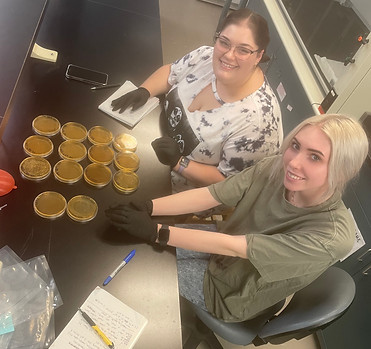Teaching Philosophy
As a science educator, I believe all students deserve equitable and accessible education that builds and contributes to a set of lifelong skills transcendent to a specific field. Using relevant, everyday examples paired with student-led, inquiry-based learning, I enable students to master course-specific objectives while building the skills necessary to succeed in any field they pursue.

Fall '21 General Microbiology Laboratory Students (University of Maryland)
Equitable and accessible education for all students
Leveraging learning styles
Enabling students with a foundational understanding of how they learn best allows them to build confidence while leveraging course materials in ways that compliment how they most effectively absorb information.
Incorporating student-led learning
Students with an understanding of how to leverage their learning styles are given a sense of ownership in their education through a flexible, student-led learning based curriculum that is guided by straightforward rubrics.
Inquiry-based, critical thinking-centered education
Scientific-method guided education
To truly master learning objectives students must be able to think critically to apply concepts to a tangible hypothesis. Utilizing the scientific method, students are enabled to pose a hypothesis and allowed to test it.
Relevant examples cultivate curious minds
To develop mindsets of lifelong learning, students must be well equipped with critical thinking skills and the knowledge of how to utilize them. I give students the opportunity to apply foundational knowledge to real world situations, allowing students to build these skills while developing vested interests in their projects.
Developing transferable skills for long-lasting success
Effective communication is key
Communicating effectively is the foundation of not just science education, but every field. To place an emphasis on building effective oral and written communication, I regularly implement communication-driven assignments with regular feedback into course curricula.
Peer review as practice in ethical feedback
Although scientists are intimately familiar with peer review, students oftentimes are not. For this very reason, I emphasize the hallmarks of ethical peer review practices throughout instruction. Engaging in peer review processes allows students to practice respectful, constructive one-on-one oral communication while building confidence in their own abilities.
Mentorship
As a research mentor to both undergraduates and high school students, I believe that learning basic laboratory skills and how to apply the scientific method in research is the foundation for a successful student. I emphasize first teaching my mentees basic laboratory skills and building their familiarity with system-specific techniques and then begin guiding them through the process of posing and testing hypotheses through independent research projects.

From top to bottom: Lindsey M. Markowitz, Jessica Garbarczyk
Undergraduates
Jessica Garbarczyk - University of Maryland, College Park
Class of 2025
Jessica has been my mentee for three years at the USDA-ARS Bee Research Laboratory where she worked closely with me on much of my dissertation research. She is listed as second author on a publication detailing our work in a honey bee host-parasite system that is currently in preparation and I am currently co-advising her undergraduate research thesis within the Biology Honors Program at the University of Maryland. She is expected to defend her thesis and graduate with honors (B.S. Biology) in May 2025 and will be co-authoring a manuscript detailing her research that we hope to submit in Spring 2025.

From left to right: Jay D. Evans, Lindsey M. Markowitz, Jessica Garbarczyk
Sulaman Shah - University of Maryland, Baltimore County
Class of 2024
Sulaman was my research mentee for three and a half years at the USDA-ARS Bee Research Laboratory. Sulaman wanted to emphasize learning advanced techniques and transferable skills during his time at the lab, so much of our work together focused on mastering techniques such as microscopy, cell culturing, and techniques used in host-microbe symbiosis research. He graduated in May 2024 (B.S. Environmental Science) and is credited in the acknowledgements section of a publication detailing my dissertation research (currently in preparation) for his assistance in developing a technique to generate gnotobiotic bees.

From left to right: Jessica Garbarczyk, Sulaman Shah, Lindsey M. Markowitz
High School Students

From left to right: Lindsey M. Markowitz, High School Mentee
I have mentored three high school students (names redacted for privacy of minors) at the USDA-ARS Bee Research Laboratory from Charles Herbert Flowers, Eleanor Roosevelt, and Oxon Hill High Schools in Prince Georges County, MD. Each student spent one academic year (September to May) in the lab completing a senior research project. I focus on teaching them relevant techniques for their projects and guide them in applying the scientific method to a hypothesis they pose. Two of these students currently attend undergraduate universities (Harvard University and the University of Wisconsin) where they are participating in honors research programs and one student is expected to complete their senior research project in May 2025.



